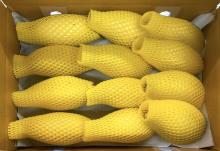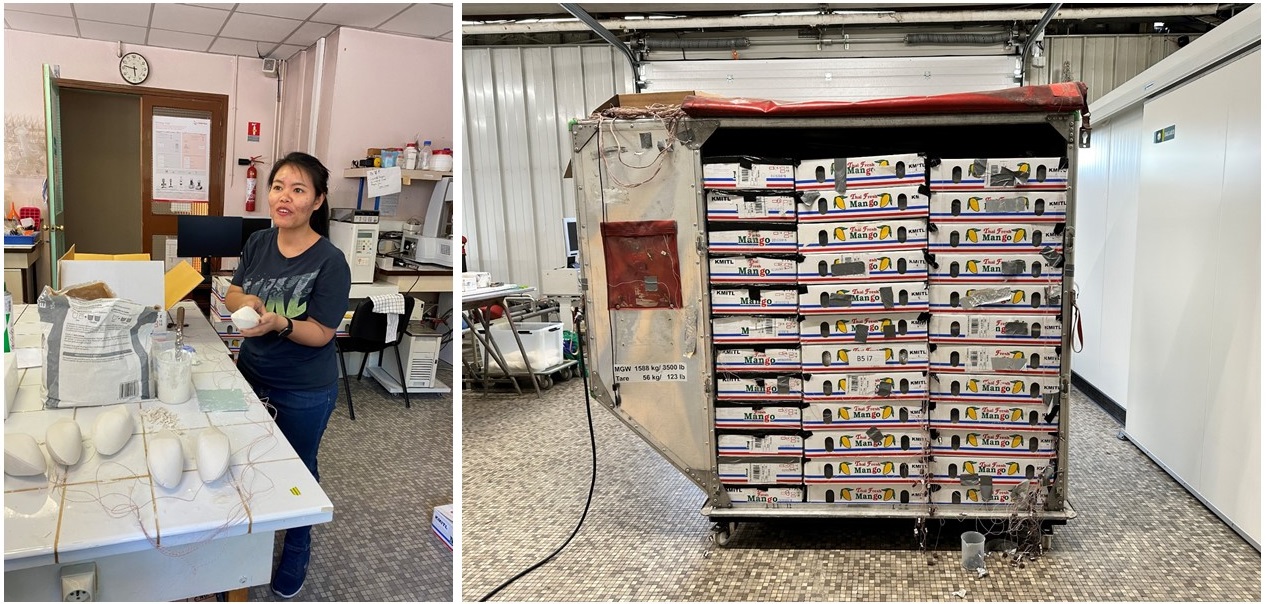Food, Global Health Reading time 3 min
REWACT, a French-Thai International Associated Laboratory on the cold chain in tropical countries
Published on 16 January 2024
Objective: Learn the specificities of the cold chain in tropical countries
The REWACT LIA consortium was created in 2023 for a period of five years (2024-2028). It integrates the skills and knowledge of INRAE's Refrigeration Process Engineering for Food Safety and the Environment Research Unit (FRISE), and Thai universities, Kasertsart University (KU) - Faculty of Agro-Industry (Bangkok, Thailand) and King Mongkut Institute of Technology Ladkrabang (KMITL) - Department of Food Engineering and Department of Agricultural Education (Bangkok, Thailand). The University of Paris-Saclay co-signed the REWACT LIA convention and facilitates the registration of exchange students.
This International Associated Laboratory broadens the scope of the successful collaboration between FRISE and Thai academic partners since 2015. It involves researcher exchanges, PhD thesis supervision and seminar organization. FRISE’s scientific challenges are to share their experience in cold research and learn the specific characterization of the cold chain in tropical countries. REWACT LIA enhances the visibility of INRAE’s research in Thailand and, in the future, in Southeast Asia.
Projects on the influence of air supply chain on fruit and vegetable quality

In collaboration with KMITL (2021-2023), FRISE conducted field studies on the influence of conditions in air supply chain on fruit and vegetable quality, with a case study of mango shipments from Thailand to France. Mangoes are a seasonal fruit (April-May), overproduction leads to about 20% losses and a sharp drop in prices, so export is a solution. Like most tropical fruits, their optimal temperature is between 10°C and 13°C, making it vital to store within this temperature range. During the air supply chain, the product may be exposed to temperatures that are too high or too low, to temperature and humidity fluctuations, particularly on airport tarmac and in aircraft holds. Inappropriate supply chain conditions may have a negative effect on product quality. In this study, FRISE provided their expertise in temperature/hygrometry instrumentation and product quality assessment upon arrival in France, data analysis and development of mathematical models to predict weight loss and colour change during a supply chain.
The outcomes of this project are numerical tools that can be used by export professionals to assess product quality on arrival in the country of destination. This tool also allows the exploration of technical or logistical solutions to limit product losses.

Following the air transport project, another project aimed to study the influence of box design on product temperature in an air cargo container. To carry out this project, FRISE hosted Suveena Jantapirak, a doctoral student from Kasertsart University (KU). She studied the cooling rate of boxes located at different positions in the container exposed to a constant ambient temperature. Thus, the identification of the coldest and warmest positions, which may damage product quality, is possible. In addition, an experimental simulation of an air supply chain was carried out by exposing the container to variable ambient temperatures. It was observed that when the container was exposed to 35°C for 2 hours under direct sunlight, which simulates the airport tarmac, the air temperature in the container reached 50°C due to solar radiation. During this period, the product temperature in the box at the top of the container increased by 10°C.
Prospects for collaboration
Survey of household refrigerator/freezer temperatures in Thailand
FRISE conducted this type of field study in France a few years ago. KMITL will carry out a survey on consumer behaviour and record refrigerator/freezer temperatures in 200 appliances in Thailand. FRISE will provide expertise in designing a questionnaire on consumer practices in food preservation at home, in temperature/hygrometer sensor placement in refrigerators/freezers and in analysing the recorded data. Comparing the results of the two countries will further enrich the FRISE cold chain database.
Study on the combined effect of refrigeration and biodegradable film on product quality
FRISE will host a master’s degree student from Kasertsart University (KU) in 2024 for 6 months to study water condensation inside biodegradable-film bags of differing permeability and product quality. The next collaboration will be to continue this study under a co-supervised PhD thesis.
The French-Thai REWACT LIA is contributing to the sustainability of the cold chain and reduction of food waste in tropical countries. The projects on the impact of air transport conditions from Thailand to France on fruit and vegetable quality have produced concrete results. The case study on mango shipment makes it possible to develop numerical tools which are useful to exporters in assessing product quality on arrival. The REWACT LIA strengthens the interdisciplinary collaboration between France and Thailand.
